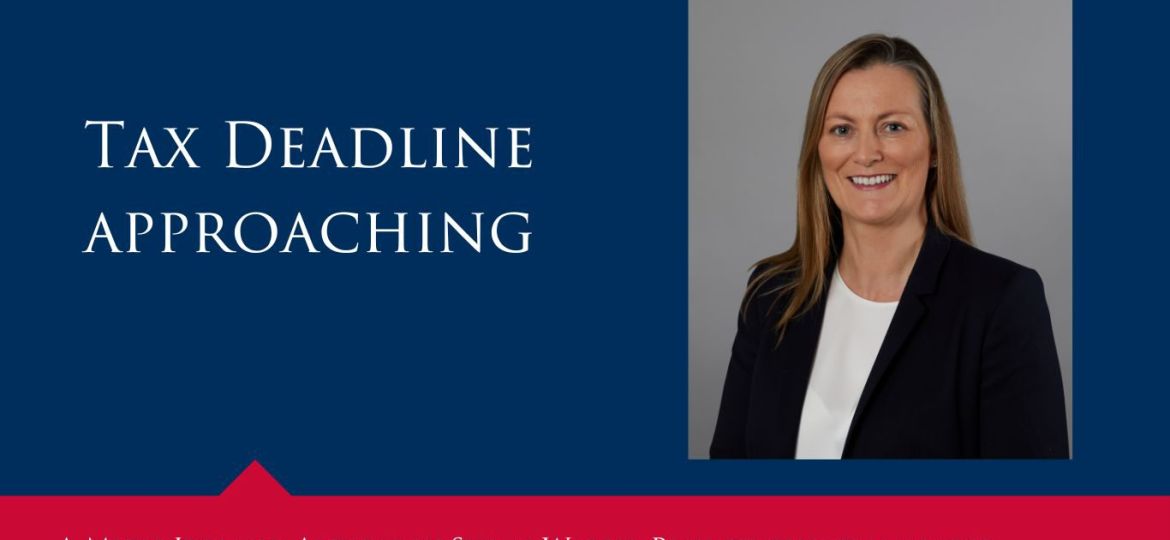
“In this world, nothing is certain except death and taxes.” And here we are again, with tax deadline just around the corner.
As the deadline for filing self-assessed tax returns approaches, it’s no surprise that this time of year gets particularly hectic.
To help you navigate the process, we’ve created a quick guide focused on preparing your self-assessed returns before the impending Income Tax deadline.
Income Tax
Who?
You should complete a self-assessed Income Tax return if:
- You are self-employed
- You have profited from share options or share incentives
- You have Non-PAYE income
- Where your only or main source of income is
- – Rental income
- – Investment income
- – Foreign income
- – Maintenance payments
- – Fees that are exempt from PAYE
When?
The deadline for the 2023 Income Tax return is 31 October 2024 for both the Income Tax balance due for 2023 and Preliminary Tax for 2024.
The ROS Extended Pay and File deadline for online returns is 14 November 2024. The extended deadline is for taxpayers who file a 2023 Form 11 Income Tax return and make the appropriate payment through ROS. Where only one of these actions is completed through ROS, the extension does not apply.
For late payments, you will be charged interest for each day (or part of a day) past the deadline.
How?
- Be organised and gather all of your business receipts, invoices, bank statements.
- The following is a summary of the information you will need:
- – All business and trading receipts
- – Details of all rental income
- – Details of any mortgage payments relating to a rental property
- – Employment Income
- – Other taxable income not taxed through payroll – medical insurance, company car, etc
- – Share awards and stock options remunerated during the year
- – Pension contributions paid during the year
- – Termination/ Ex-gratia payments awarded
- – Deposit interest on bank and credit union accounts
- – Dividends received from shares
- – Details of any exempt income such as rent-a-room relief, etc.
- – Maintenance payments
- – Medical expenses
- – Income protection premium payments
- – Foreign income including rent and pensions
- Ensure you have adequate funds in your bank account to pay your liability for 2023 and preliminary tax for 2024 prior to the deadline.
- Complete and return Form 11 to Revenue by 31 October 2024.
If you wish to avail of the extended ‘File and Pay’ deadline you must register for ROS online prior to the deadline and complete both the returns and payments by Thursday 14 November. Consider appointing an accountant if you are not comfortable completing the returns yourself.
Remember:
One way of reducing your tax bill is to make a pension contribution for 2023 prior to the deadline and avail of full tax relief. The pension contribution must be received by your pension provider prior to the deadline in order to be allowable in the Income Tax return for the previous year. Therefore, please ensure you talk to your financial advisor in advance of the deadline.
Capital Acquisitions Tax
Beneficiaries who received gifts or inheritances with valuation dates in the year ended 31 August 2024 must also make a return prior to 31 October. The deadline is extended to Thursday, 14 November 2024 for those who file a Capital Acquisitions Tax return and make the appropriate payment through ROS.
Valuation dates vary depending on the gift or inheritance, please see www.revenue.ie for full definitions of these dates.
Local Property Tax
If you owned a residential property on 01 November 2023, you are liable for LPT for 2024 on that property, even if you do not usually live in that property. You will need to ensure that you meet your LPT obligations for 2024. In order to meet your obligations you should again follow the Revenue guidelines here: https://www.revenue.ie/en/property/local-property-tax/index.aspx
Capital Gains Tax
If you dispose of an asset you must pay Capital Gains Tax (CGT) on the gains/profits on the disposal of that asset. CGT returns are due as follows:
- For disposals between 1 January and 30 November (the initial period), you must pay CGT by 15 December of the same year.
- For disposal from 1 December and 31 December (the later period), you must pay CGT by 31 January of the next year.
Resources
We hope that this guide has been useful. For further and more detailed information, please visit the Revenue website itself, with particular attention to the Pay & File guide. You can also access additional information from Citizens Information.
Disclaimer:
Metis Ireland is not a tax advisor. The above is a summary and should not be used as an extensive guide to completing tax returns. You should speak to your accountant and/or Revenue for full guidance.
Disclaimer
Metis Ireland Financial Planning Ltd t/a Metis Ireland is regulated by the Central Bank of Ireland.
All content provided in these blog posts is intended for information purposes only and should not be interpreted as financial advice. You should always engage the services of a fully qualified financial adviser before entering any financial contract. Metis Ireland Financial Planning Ltd t/a Metis Ireland will not be held responsible for any actions taken as a result of reading these blog posts.


